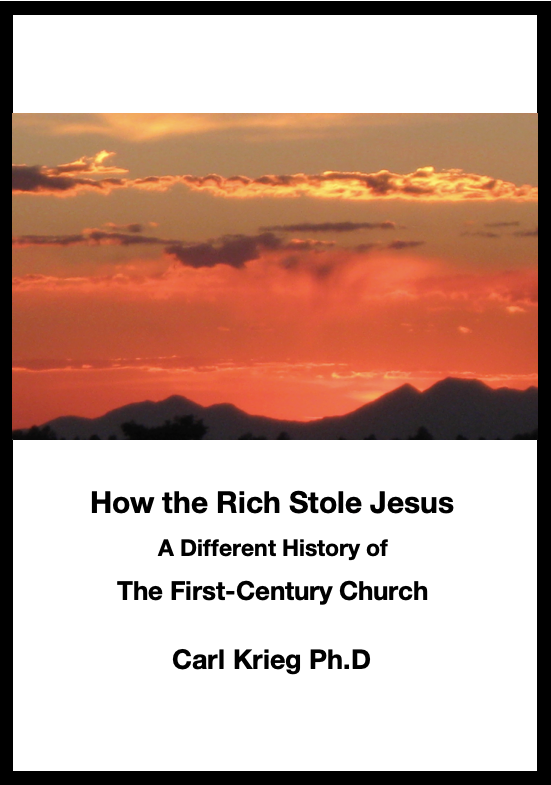How The Rich Stole Jesus – PDF Version
A Different History of the First-Century Church

The message was simple. Love God. Love your neighbor. Join hands in a fellowship of peace and justice. It was an invitation to fulfillment, accepted by many. This new life stood in stark contrast to the society in which they lived, a society based on corruption and exploitation of the poor masses by the wealthy. These disciples shared what they had with one another, and they cared for one another. All together, women and men, a fellowship of friends who, by their very existence, posed a threat to the politico-religious establishment.
Aware of this threat to their position and power, the wealthy sought to quash the movement before it grew and succeeded in having Jesus crucified. The problem was- and this is something that they could not comprehend- it was not the body but the Spirit of Jesus that gave power to these new disciples. The followers of Jesus understood this Spirit not as a memory, some dimension of human consciousness, but as a new way of being, one that transcends the human ability to comprehend. It was really real. The disciples, wherever and whoever and whenever they were, were convinced that their Lord and Master was alive and present in their
midst.
That certitude threatened the rich and powerful. Unable to stop the movement by crucifying the leader, they infiltrated the group and took it over. They shifted the focus away from the Spirit of Jesus that lived on and inspired the fellowship toward one-time events over and done. The crucifixion became a one-time act of sacrifice in God’s eternal plan of salvation. And instead of a Spirit immanent in the continuation of the new life of peace and love, the resurrection became a one-time walking out of a tomb, followed by an ascent into heaven, to be followed by a return to earth at some future but unknown day.
This book initiates a probe into that takeover.
Review
Carl Krieg’s collection of well-written essays demonstrates how the first-century church hijacked the message of Jesus. Jesus, the prophet of economic and social justice, inclusion, and nonviolent approaches to resolving conflict, became Jesus, the savior of the world, the man whom God chose to die for human sin. Why this change in the message? Krieg convincingly argues the upper-class elites who captured control of the church felt their economic interests threatened by the prophetic message of Jesus. Krieg’s timely essays explain why the Christian church has largely failed to make the world a better place. – Rick Herrick, author of A Christian Approach to Political Decision-Making, Introducing Whisper Economics.
~~~~~~~~~~~~~~~~~~~~~~~~~~~~~
About the Author
 Carl Krieg, Ph.D. received his BA from Dartmouth College, MDiv from Union Theological Seminary in NYC, and Ph.D. from the University of Chicago Divinity School. He is the author of What to Believe? the Questions of Christian Faith, The Void and the Vision and The New Matrix: How the World We Live In Impacts Our Thinking About Self and God. As professor and pastor, Dr. Krieg has taught innumerable classes and led many discussion groups. He lives with his wife Margaret in Norwich, VT.
Carl Krieg, Ph.D. received his BA from Dartmouth College, MDiv from Union Theological Seminary in NYC, and Ph.D. from the University of Chicago Divinity School. He is the author of What to Believe? the Questions of Christian Faith, The Void and the Vision and The New Matrix: How the World We Live In Impacts Our Thinking About Self and God. As professor and pastor, Dr. Krieg has taught innumerable classes and led many discussion groups. He lives with his wife Margaret in Norwich, VT.
